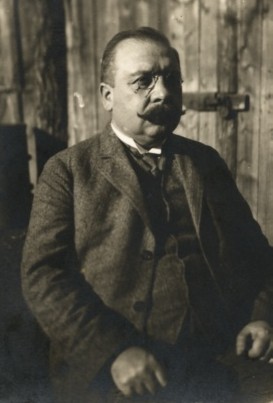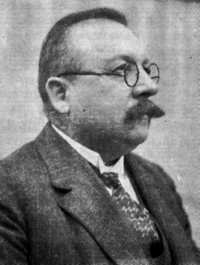11th September of this year marks one hundred and thirty years since the birth of Franjo Dugan, one of the most prominent figures in the history of Croatian music. He died at the age of 74, after a long and difficult illness in Holy-Spirit hospital in Zagreb. On the occasion of the tenth anniversary of his death (1958) one could read neither in his homeland nor, even more tragically, in exile a single line dedicated to this outstanding figure in Croatian musical and educational life.
Born in Krapincica in Zagorje, on 11th September 1874, Franjo Dugan graduated at the Grammar School (gymnasium) in Zagreb, and then commenced his studies of mathematics and physics at the University of Zagreb.
In his early years Dugan was drawn by another branch of human activity, music, which soon became his life's goal. And his favourite means of musical expression was the organ, with which he became familiar in Zajezda. Dugan was a self-taught musician. In Grammar School he became acquainted with Vatroslav Kolander, the organ player of the Zagreb metropolitan cathedral, and later became his successor. In 1900 Dugan married Ana Jagic, the niece of the Croatian expert on Slavic languages, Vatroslav Jagic. Out of his six children the most prominent were his eldest son Franjo, a distinguished composer, and the younger Cedomil, who was a piano player and organ-virtuoso. In 1907 Dugan left for Berlin to master his Science of Music, where he passed the composition exam in July, 1908. He often spoke fondly of his teachers, Max Bruch and Robert Kahn, two famous German composers.
After his return to Zagreb, Dugan led a fierce fight against Zagreb's petty bourgeois musical coterie and their views until 1930 when, after becoming a director of Academy of Music, he began to elevate the study of the principles of music to new heights. It lifted Croatian musical institutions to a position of high esteem in the overall dilettante endeavour of the 19th century, and raised musical study to a University-level discipline. On the recommendation of Croatian poet
Dragutin Domjanic, Dugan became a regular member of the newly-founded musical class of the Yugoslav Academy. During all that time, Dugan kept in touch with the journal Vijenac, led "St. Marcus Oratorian Choir" (1923-1926) and gave numerous organ concerts in Croatia and abroad.

In 1944, on the occasion of his seventieth birthday, Dugan's educational work was recognised by the Croatian people, i.e. by the minister of religion and education, Dr. Makanec. And this was how he came, in 1945, to be sentenced to nine months "prohibition of public work”, and then expelled from the Yugoslav Academy - by his own students. Obviously, this act of the Communist party was intended to destroy Professor Dugan morally, professionally, and to do so for the rest of his life; and this, a man who had devoted himself entirely to the elevation of Croatian musical and educational life in general. After a severe nervous breakdown, which he survived, Dugan fell ill with cancer and on the night of 13th December, 1948, in Holy-Spirit hospital in Zagreb, he passed away in the presence of his daughter (my mother) Micika (Marija). As the Communists were afraid of a grandiose funeral, the death of Franjo Dugan was not even announced in the daily obituary of the journal Narodni List. Yet the funeral procession did take place in a grandiose fashion, accompanied by the tolling of a large number of church bells in Zagreb.

As far as Dugan's public work is concerned, I would like to mention three fields of his work: the revival of Croatian church music; his contribution to the Caecilian movement in Croatia; and the revival of music teaching in Zagreb. There is also his composing work.
During the 19th century, foreign church music became common in Croatia, "to which", writes Dugan in the Croatian encyclopaedia, "foreign organists in the Croatian churches spoiled the taste of our people because they contained trivial dancing rhythm, distasteful texts, and melodies that did not accord with Croatian musical tradition." To improve this state of affairs Dugan brought to light the old Croatian song-book,
Cithara Octochorda ( 1701., 1733., 1757.), the
Paulinian song-book (1641.), and later the collection of songs by Gjuro Veljkovic from 1808 and 1816. From these collections he selected works on the basis of their Croatian or choral meaning. In his capacity as musical editor of church music presentation for St. Caecilia, he championed them for their skilful harmonization. This entire endeavour led to the creation of a new synthesis of our national and artistic church music in the Croatian Church Chant, which is the most important strand in the caecilian re-arrangement of Croatian church music.
Along with Croatian church music, Dugan also worked with Gregorian Chant. Being an organist he was in constant touch with this music, but he also studied in great depth the critical work of foreign and, particularly, Italian experts in the field. He held that the choral shouldn’t be of only dead archaeological value but imbued with all modern and harmonious meanings, which do not clash with the original spirit but are living organisms in the life of Church. Having this in mind he harmonized the standard choral canon, in which setting his masterly elaborated Croatian hymns became particularly distinguished. In this way Dugan elevated the accompaniment of the Roman choral in Zagreb cathedral to one of the most prominent in Europe.
Besides Dugan’s work in restoring church music, he distinguished himself in his studies of science and education. Side by side with his organisational work, Dugan took over the teaching of theoretical disciplines such as acoustics and studies in instruments, as well as the analysis of musical forms, the Gregorian Choral and the main subjects in theory like harmony, fugue with imitation and canon, and composition. One should not forget, also, that he was teaching organ through a long period of his life. In his dedication to this broad field, Dugan produced many textbooks like Studies in Elementary Theory of Music (1922), Practice for Choir Singing (solfeggio) (1923), Studies in Musical Forms (1932), Studies in Instruments (1936), Studies in Instruments (1944, destroyed under the communist government), and many other scripts which he used as groundwork for later works (which, unfortunately, remained just scripts). Studies in Forms and Acoustics (1943), however, was written at the time other recognised experts in physics and music were only just addressing the phenomenon – which is indeed a rare event. All this achievement is underscored by the fact that everything originated from Dugan's work in the Academy of Music.
In addition to all this, Dugan educated an entire generation of organ musicians, including his son Cedomil Dugan and son–in-law Mladen Stahuljak, and Franjo Lucic; composers Franjo Lucic, Boris Papandopulo, Josip Stolcer-Slavenski, dr. Bozidar Sirola, Stjepan Sulek, Branimir Sakac, Ivan Matetic-Ronjgov, Slavko Zlatic, and the well known Serbian composer Marko Tajcevic.
The immensity of Dugan’s educational contribution did not allow him to write as much music as he would have wanted. Even so, one cannot overlook his compositional work. Among numerous choir compositions there are prominent secular pieces such as Listen you my Sweetie (1896), On the Water (1897), Three Springs (1903) set to the words of Stanko Vraz, Carmen saeculare (1913), and The Sea Willow (1923). Dugan's sacred compositions Prayer (1901), We Praise you Lord (1901) to the words of
Marko Marulic, Croatian Mass (1901), and the offertory Ad Te Domine ( 1939), dedicated to the Archbishop Dr. Antun Bauer. For the beauty of the organ accompaniment to these sacred works one could add Regina coeli (1895), Salve Regina (1902), For Wedding (1928) to the words of Petar Preradovic, and Ave Maria (1932).
Source:
www.croatianhistory.net (in Croatian and English)